#psychology of religion
Text
youtube
17 notes
·
View notes
Text
People will always prefer black-and-white over shades of grey, and so there will always be the temptation to hold overly-simplified beliefs and to hold them with excessive confidence.
Thomas Gilovich, How We Know What Isn't So: The Fallibility of Human Reason in Everyday Life
536 notes
·
View notes
Text
An international research team led by the Hong Kong University of Science and Technology (HKUST) has uncovered in a recent research project that people's beliefs in science and religion are primarily shaped by the words of others, rather than their personal experiences. The study could help enhance public understanding of people's belief formation in important scientific issues, such as climate change and vaccination.
The team's findings, realized in collaboration with researchers at Harvard University, Union College, and Massachusetts Institute of Technology, were published in Trends in Cognitive Sciences.
Conventionally, people are generally more confident about the existence of scientific phenomena, like oxygen, than religious phenomena, like God, as it is thought that people can experience oxygen, for instance, while it is harder to observe religious entities on one's own.
Continue Reading.
93 notes
·
View notes
Text

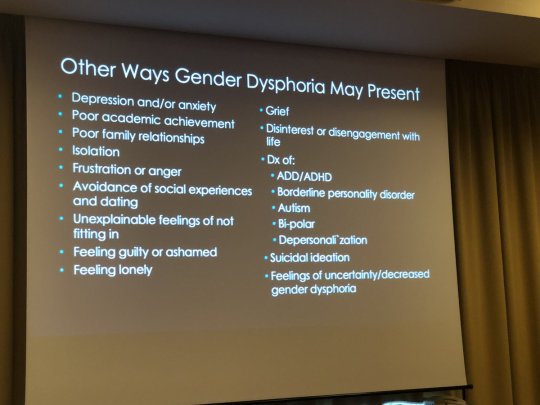
[ Source: EPATH Conference 2019. ]
Apparently being a regular teenager is a disorder requiring medical treatment and the removal of body parts. Not only are you "trans" if you don't fit a 1950s Barbie/G.I. Joe stereotype, you're "trans" if you don't fit a 1950s "golly, gee" soda shoppe "Leave It To Beaver" stereotype.
This is the same tactic psychics use to tell you your fortune, and astrologers use to convince you that distant stars reflect your personality. It's called the Forer Effect, or Barnum Effect.
To really drive home the cult programming, any time you're feeling better, that's how you know you've gotten worse.
For political and ideological reasons - for example, one presenter actually claims that children are being "misdiagnosed" as autistic when they're actually trans - they've flipped the symptom and the cause.
This is more accurate:
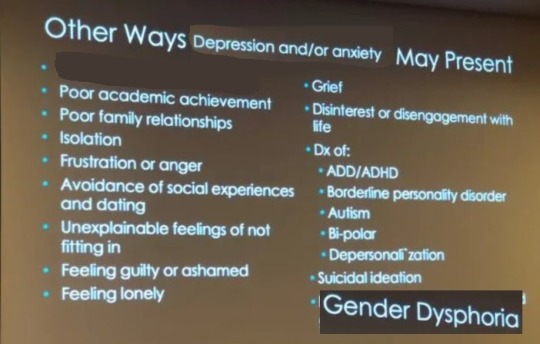
#Wilfred Reilly#gender cult#queer theory#gender ideology#mental health#mental health issues#gender dysphoria#gender anxiety#puberty#unethical#medical scandal#medical malpractice#ideological capture#psychology#human psychology#sex trait modification#genderwang#religion is a mental illness
735 notes
·
View notes
Text
Nothing worse than getting into a new subject and having no one to discuss it with
#self education#nerdy girls#philosophy#psychology#neurology#spirituality#religion#ethics#esoteric#literature#pop culture#video essay#art#art history#history#science#astronomy#quantum physics#politics#documentary#aa
162 notes
·
View notes
Text
Man has it all in his hands, and it all slips through his fingers from sheer cowardice.
Fyodor Dostoevsky
#fyodor dostoevsky#dostoevksy#quotes#philosophy#wisdom#life#literature#writer#books#write#psychology#cowardice#religion#existentialist#existentialism
270 notes
·
View notes
Photo
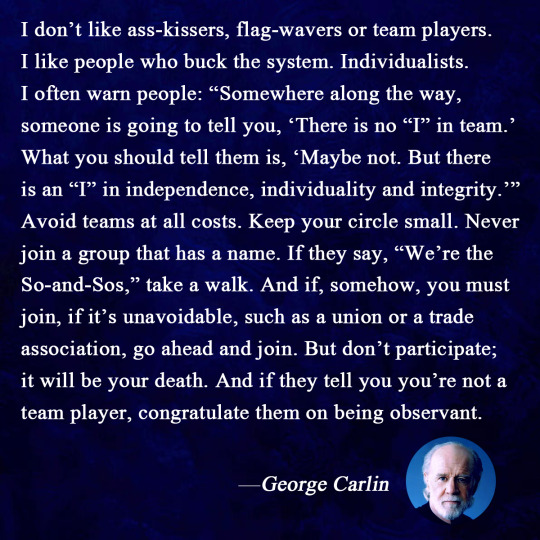



#George Carlin#individualism#individualist#freethinker#free thinker#nonconformity#nonconformist#question everything#think for yourself#psychology#wisdom#religion#god#question
316 notes
·
View notes
Text
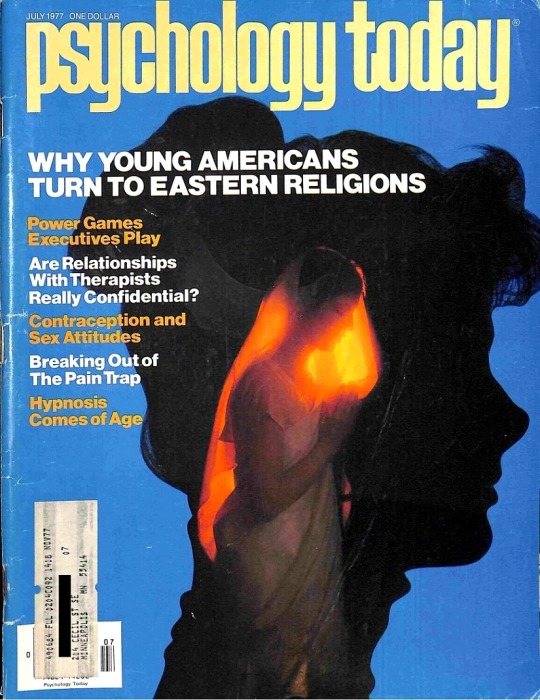
Psychology Today, magazine, Ziff-Davis Pub., July 1977
#witches#psychologists#occult#vintage#psychology today#eastern religions#ziff davis#july 1977#1977#magazine#ziff-davis#hypnosis
60 notes
·
View notes
Text
It is in the nature of animals to lack grace. To reflexively react. To fight. To flee. To devour. To teem with fecundity.
Mankind also possesses these abilities, but with the additional ability that leaves him capable of silently contemplating and reflecting on all of these things with language.
And I'm not sure who is better off. Animals or mankind.
86 notes
·
View notes
Text
Reverend Wally
Wally X Reader
AO3 Link
Content Warning: Psychological Horror, Scopophobia, Religion and Religious Symbolism, Christianity, Demons
"Our father, who art in heaven-"
Hands clasped tightly together, you pray alone in front of the alter. It's far too late for anyone else to be here, but that is somehow more comforting in a time like this.
"-hallowed be Thy name; Thy kingdom come; Thy will be done on earth as it is in heaven-"
You stare up at the large pillars of the church, the tall sharp architecture and the stained glass windows. If it were day, the windows would show the stations of the cross, going through the entirety of the crucifixion. Now though, they're only dark and hollow, the reflection of the candle's light on the surface mimicking eyes.
"Give us this day our daily bread; and forgive us our trespasses-"
Are you speaking to no one? Will no one answer your prayers?
"-as we forgive those who trespass against us; and lead us not into temptation-"
You feel a warm hand curl around your shoulder. They recite the last line of the prayer in unison with you.
"-but deliver us from evil."
You whip your head around only to see Father Wally Darling smiling down at you. You're used to seeing him in his mass attire, but now he wears more casual clothes. The only indication that he's a reverend is the small cross he adorns around his neck.
"Father-"
"Why are you here so late, my child?" He asks, tilting his head. His eyes are soft and kind, just as you always remember them.
"I-" You look at the floor, then back to the alter. "Father... have you ever performed an exorcism?"
He freezes, then chooses his words carefully. "Why would you be getting mixed up in such dark things?"
"I fear there is a demon following me." You tell him, standing from your kneeling position. "Or some dark energy, in the least."
Wally runs a hand over his chin, his eyes trained to the floor. "These things don't just appear. Did you-" His eyes flick up. "-invite them in somehow?"
"I swear, I have been faithful to you and our church." You bow your head. "But lately I feel as if I've been watched. Even now, I can feel the eyes boring into me." You glance around the dim chapel. The statues, the paintings, even the knots in the floorboards are eyes staring into your soul.
"Of course you have been loyal to me, my child." He grips your chin, moving your head so that you're staring into his eyes. "The only pair of eyes you have to worry about here are mine. This place is safe."
You grasp nervously at your hands, continuing to stare helplessly up at him. "Father, what am I to do?"
He lets go of your chin, running a hand through his hair. "We won't perform a exorcism, that is only for the most extreme of cases. We shall have a baptism of sorts."
"But I am already baptized." You tell him, confusion written all over your face.
"Of sorts, I said." Wally leads you up the steps to the alter. "It's bit different."
You let him take the lead, following his instructions as you set up the equipment. You've never heard of another type of baptism, but you trust that a reverend knows more about this than you do.
Once everything is set up, he motions with his hands, "Kneel before me, child."
You fall to your knees. It feels like worship.
He dips his hand into the water, bringing it to your face. You had watched him bless the water just moments earlier. He presses his thumb against your forehead, drawing some sort of shape. It doesn't feel like a cross.
"You've always been quite the dedicated follower." He whispers quietly, wet hand moving to now cup your cheek.
"Yes, father." You agree, unsure of where he is going with this.
"I wish to have you." He says, voice low. "What do you wish for in return?"
You blink up at him, "Have me?"
"Semantics." He brushes it off. "I merely mean to have you in the sense of a loyal worshipper of the church."
"Oh, okay." You pause. "I wish..."
What do you wish for?
"I wish to be safe."
"Oh, I would never let anything hurt you." He assures. Still, he extends his hand. "I wish to have you. You wish to be safe."
You're not quite sure what he expects from you, but you take his hand. He gives a large smile, holding your hand tight. "Thank you, my dear."
There's a gush of wind and the candles go out in the church, leaving you in darkness.
The eyes.
The only thing that is luminescent in the darkness are Wally's eyes. They glow, staring down at you. You yank away your hand, scrambling backwards as more eyes appear in the blackness. You have to escape.
You have the church layout memorized and move easily through the pews. The eyes appear everywhere, lighting your way. When you reach the door, you find that it's locked. You bang against it.
The window. Your hands scramble to find anything heavy. A small Jesus statue sits upon a table.
Sorry Jesus.
Taking the statue, you heave it against the window. Despite the statue's weight, the window doesn't shatter. It only stares down at you.
"Is this any way to act?" It's Wally's voice, but it's more distorted now. "I promised you that you would have your safety, didn’t I?"
"I didn't agree to this!" You protest, chest heaving. You feel cornered, the eyes are in every direction now.
"Oh, but you did." He laughs. "That's how it works, you shook my hand and made a wish. I'm keeping up my end of the deal."
Something grabs onto your ankle. You try to kick it off but it yanks you, making you fall to the floor.
"It's time to keep your end. Don't worry, I take good care of my playthings"
You're dragged further into the church, kicking and screaming.
This was never a holy place.
#wally darling#fanfic#fanfiction#horror#wally x you#welcome home#welcome home wally#psychological horror#religion#christianity#priest wally#wally x y/n#wally darling x reader#wally fanfic#scopophobia#demons
244 notes
·
View notes
Text
The cost of sanity in this society is a certain level of alienation.
Terrence Mckenna
374 notes
·
View notes
Text
Before he was burned alive by Spaniards, chief Hatuey of the island of Hispanola was asked if he would accept Christianity to go to Heaven.
Hatuey asked whether or not Spaniards go to Heaven, to which the priest responded they do.
Hatuey declined, saying he would rather go to Hell, where he wouldn't see such cruel people.
@thehumanityarchive
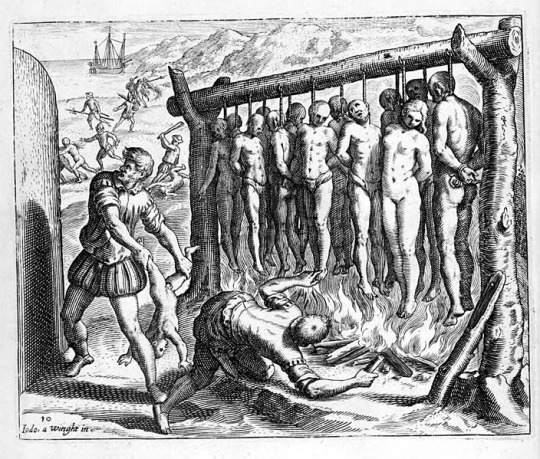
54 notes
·
View notes
Text
By: Anonymous
Published: Oct 16, 2023
When my first son claimed he was trans, I eagerly ‘affirmed’ him. When his three-year-old brother decided he wanted to be trans, too, I realized I’d made a terrible mistake.
I was a social-justice organizer and facilitator before social justice took over the progressive world. I was at the nascent movement’s forefront, introducing the concept of intersectionality to organizations and asking people to share their pronouns.
My friends and I felt like we were the cool kids, on the vanguard of the revolutionary wave that would change the world. We were going to achieve what people in that milieu call “collective liberation.”
Within this context, I came out as a lesbian and identified as queer. I also fell in love, entered a committed relationship, and gave birth to a son. Two years later, my spouse gave birth to our second son.
Having children and experiencing the love and devotion I felt toward them, was a game changer for me. I began to experience internal tensions. My thinking was split between what I felt instinctively as a mother; and what I “should” be feeling and doing as a white anti-racist social-justice parent.
Because I’d felt victimized by my parents’ rejection of my sexuality, I wanted to make sure to honor my own children’s “authentic” selves. In particular, I was primed to look for any clues that might suggest they could be transgender.
My spouse and I raised our sons with gender-neutral clothes, toys, and language. While we used he/him pronouns, and others called them boys, we did not call them boys, or even tell them that they were boys.
In our everyday reading of books or descriptions of people in our lives, we did not say “man” or “woman”; we said “people.” We thought we were doing the right thing, both for them and for the world.
Even when our first son was still young, he already struck us as different from other boys—being both extremely gifted and unusually sensitive. By age three or so, he started to orient more toward the females in his life than the males. “I like the mamas,” he would say.
We started to attribute some of this difference to the possibility that he was transgender. Instead of orienting him toward the reality of his biological sex by telling him he was a boy, we wanted him to tell us if he felt he was a boy or a girl. As true believers, we thought that we should “follow his lead” to determine his true identity.
At the same time, I was taking a deep dive into the field of attachment and child development. This made me understand that attachment is hierarchical; and that parents, not children, are meant to be in the lead. This obviously conflicted with my insistence on letting my child decide his gender. Sadly, it was the latter impulse that won the day.
At around age four, my son began to ask me if he was a boy or a girl. I told him he could choose. I didn’t use those words—I imagined that I was taking a more sophisticated approach. I told him, “When babies are born with a penis, they are called boys, and when babies are born with a vagina, they are called girls. But some babies who are born with a penis can be girls, and some babies born with a vagina can be boys. It all depends on what you feel deep inside.”
He continued to ask me what he was, and I continued to repeat these lines. I’d resolved my inner conflict by “leading” my son with this framework. Or so I told myself.
His question, and my response to it, would come back to haunt me. In fact, I remain haunted to this day. To the extent I was “leading” my son anywhere, it was down a path of lies—an on-ramp to psychological damage and irreversible medical interventions. All in the name of love, acceptance, and liberation.
About six months later, he told my spouse that he was a girl and wanted to be called “sister” and “she/her.” I received a text message about this at work. On the way home that night, I resolved to put all my own feelings away and support my transgender child. And that is what I did.
We told him he could be a girl. He jumped up and down on the bed, happily saying, “I’m a girl, I’m a girl!” We—not our son—initiated changing his name. We socially transitioned him and enforced this transition with his younger brother, who was then only two years old and could barely pronounce his older brother’s real name.
When I look back at this, it is almost too much to write about. How could a mother do this to her child? To her children?
Once we made this decision, we received resounding praise and affirmation from most of our peers. One of my friends, who’d also socially transitioned her young child, assured me that this was a healthy, neutral way to allow children to “explore” their gender identity before puberty, when decisions would have to be made about puberty blockers and hormones.
We sought out support groups for parents of transgender children, so that we could find out if we’d done the “right thing.” It hadn’t escaped my notice that our son hadn’t exhibited any signs of actual gender dysphoria. Was he actually transgender?
At these support groups, we were told, again, what good parents we were. We were also told that kids on the autism spectrum (which our son likely is) are gender savants who simply know they are transgender earlier than other kids.
At one of the support groups we attended, we were also told that transgender identity takes a few years to develop in children. The gender therapist running things told us that during this period, it’s important to protect the child’s transgender self-conception—which meant eliminating all contact with family or friends who didn’t support the idea that our son was a girl. I believed her.
Looking back, I now see her comments in a shockingly different light: this was part of an intentional process of concretizing transgender identity in children who are much too young to know themselves in any definitive way. (One set of parents attending the group had a child who was just three years old.) When identity is “affirmed” in this manner, children will grow up believing they are actually the opposite sex.
The therapist endorsed the same approach that many adolescents use on their parents, who are urged to write letters to grandparents, aunts, and uncles to announce the child’s transgender identity. In these letters, the conditions of continued social engagement are made clear: Recipients must use the new name and new pronouns, and embrace the new identity, or they will be denied contact with the child.
After about a year of social transition for our older son, our younger son, who was by now only three years old, began to say he was a girl, too. This came as a complete shock to us. None of the things that made our older son “different” applied to our younger son. He was more of a stereotypical boy and didn’t show the same affinity for the feminine side of things that his older brother did.
The urge for “sameness” is a primal attachment drive in many family members. We felt that our younger son’s assertion of being a girl likely reflected his desire to be like his older sibling, in order to feel connected to him.
His claim to be a girl became more insistent when both brothers went to school part-time, because their program included pronoun sharing. Why could the older sibling be a “she” when the younger sibling couldn’t? Our younger son became more insistent, and we became more distressed.
We made an appointment to see the gender therapist whom we’d met at the support group. We truly believed that she would be able to help us sort out who, if anyone, was actually transgender.
To our shock, the therapist immediately began referring to our younger son as “she,” stating that whatever pronouns a young child wants to use are the pronouns that must be used.
She patronizingly assured us that it might take us more time to adjust, since parents have a hard time with this sort of thing. She added that it was transphobic to believe there was anything wrong with our younger son wanting to be like his older transgender sibling.
When I pushed back and asserted that I wasn’t yet convinced our younger son was in fact transgender, she told me that if I failed to change his pronouns and honor his newly announced identity, he could develop an attachment disorder.
We were unconvinced. But, again, we wanted to do what was right for our son and for the world. We decided to tell him he could be a girl. And that night at dinner, we told him that we would call him “she/her.”
Right after dinner, I went to play an imaginary game with him, and I wanted to be affirming. So I put a big, warm smile on my face and said, “Hi, my girl!”
At this, my younger son stopped, looked at me, and said, “No, mama. Don’t call me that.” His reaction pierced me to my core. I didn’t turn back after that.
For the next two years, my partner and I dug deeper, agonized, and then continued digging again. Everything we thought we knew or believed that had led us to socially transition our older son began to unravel.
I continued to study the attachment-based developmental approach to parenting and learned more about autism and hypersensitivity. We decided not to socially transition our younger son. Not only was he not transgender, we now realized, but our older son probably wasn’t either.
He was just a highly sensitive, likely autistic boy who saw a girl identity as a form of psychic protection. It also provided him a way of attaching to me through sameness.
My spouse and I decided that since we’d been the ones who’d led him down this path, we were the ones who needed to lead him off of it.
A year ago, just before our older son’s eighth birthday, we did just that. And while the initial change was hard—incredibly hard—the strongest emotion exhibited by our son turned out to be relief.
In the days following my first conversation with him about going back to his birth name and pronouns, during which I told him that males cannot be females and that we were wrong to tell him he could choose to be a girl, he got very mad at me, then sad. Then, the next day, I felt my son rest. I felt him release a burden, an adult burden that he, as a child, was never meant to carry.
Since that time, we’ve all been healing. My son is now happy and thriving. We’ve watched him come to a deeper peace with himself as a boy.
Our younger son is also thriving. Once his older brother became his older brother again, he happily, and almost immediately, settled into his identity as a boy.
I feel like someone who’s escaped a cult—a cult whose belief system is supported by our mainstream culture, the Internet, and even the state.
I fear for the future—the future of sensitive, feminine, socially awkward boys. I fear what the world will tell them about who they are.
But no matter what the future holds, I will never ever stop fighting to protect my sons. I am no longer a true believer.
#gender ideology#queer theory#genderwang#gender cult#social transition#autism#social justice#critical social justice#affirmation model#gender affirming#gender affirmation#trans identity#gender identity#child psychology#religion is a mental illness
121 notes
·
View notes
Note
Honestly with my understanding of how your cycles work it would be funny to see an interaction between a human and an ancient where they are like "Woe is us we are trapped in a cycle blah... blah (basically longwinded explenation of how it works)" and the person is just like "I don't see the issiue here that's cool as fuck"
yes, well... part of why the rebirth cycle (Small Cycle) became so despised *is* because of propaganda. originally the thing was seen as a gift worth worshipping and praising, but as most things usually do, it has some downsides that certain group of people latched on to to demonize it
most of those being the aftermath of waking from death. such as still feeling the pain of the injury that killed the individual. it's relatively fine if one gets a fast death like a Noot stabbing, but if it's death like bleeding out from dismemberment? waking up feeling the pain of it, the phatom body part aspect even though it's Right There and not being able to treat it until it fades on its own isn't so fun
then the mental scarring of going through something like that...
the raincarnation cycle (Great Cycle) became despised because of something like a spirit's depression/nearly chronic frustration. low karma Ancients (under karma level 7) experience those kind of feelings seemingly out of nowhere, detached from the situation happening in the physicality
one can be eating their most favorite food ever and suddenly Bam, feelings of anger, sadness and frustration all at themselves. this happens because the spirit is aware it isn't moving forwards in cultivation/towards natural Ascension as it is supposed to and that upsets it
and judging by the existence of Those -points at Iterators- not many people actually work on bettering themselves because Why would they? They have the Iterators to get them the reward for becoming a good person without them having to change anything
so the nearly chronic spirit frustration/depression is common
#spot says stuff#rw#once again reminder that the rw world is very different from ours not only in fauna and flora thats right in front of the player but also-#-in the spiritual (aka psychological [inserted by personal definition of the word]) aspects as well#a human could sympathize but stuff like the loud despair of soul just isnt a thing with us. the closest we could get is religions guilt-#-tripping people but while That is terrible the ancients' thing is more like a guilt for being a bad person detached from physicality#its an internal self-critique they cant escape. unless maybe they r just really That shitty 🤔 -pokes mural karma 1 attacker ancient- hmm..
34 notes
·
View notes
Text
This is just a thing I see on my internet romps every now and then but it drives me crazy for no reason, bare with me.
Why do people draw lines in the sand about different kinds of therians lol? Who cares if someone woke up and decided that they're wolf therian or something when you decided unconsciously you were a wolf therian instead. Why do people fight about whether or not someone can choose to be therian, its the most silly gatekeeping I see.
And don't come at me saying "well theres this label for chosen therians because they're not actual therians like me" you guys... made these terms up in the first place it literally doesn't matter. There is absolutely zero difference between a chosen therian and a not chosen therian and you can't convince me otherwise. How would a self proclaimed "real" therian know that they didn't just choose to be therian one day, there's absolutely no way you can know that for sure.
Every time I become curious about a subculture there's always some ridiculous gatekeeping, even objectums seem to fight over silly bullshit.
#yes I know there's a part of the community that values more spiritual beliefs#but i'm talking more in a tangible sense#there's no difference between the two that anyone can tell so why does it matter at all#like actual religions aren't even this strict when it comes to this stuff#even closed practices tend to have a tangible thing you can assign yourself to like genetics or being let in by someone#I suppose I'm of the belief that everyone chooses to be therian in a sense#even if it was from a young age#you're influenced by your environment#otherwise more people would be totally random animals like ant or earth worm therian#and thats not to say I view it as any less real I just view it as a more psychological thing rather than anything spiritual#and I believe I have the right to believe in that just as much as a spiritual therian does
41 notes
·
View notes
Text
A beast can never be as cruel as a human being, so artistically, so picturesquely cruel.
Fyodor Dostoevsky
#fyodor dostoevsky#dostoevksy#quotes#philosophy#wisdom#life#literature#writer#books#write#psychology#religion#existentialism#existentialist#beast#beasts#human being#cruel#cruelty
178 notes
·
View notes